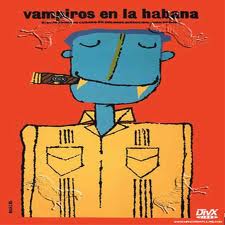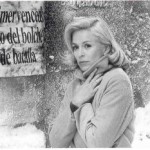Blog del Instituto Cervantes de Dublín
Torre Martello
Presentación de libro | Book Launch: Forked Tongues. Poetas gallegas, vascas y catalanas traducidas por poetas de Irlanda
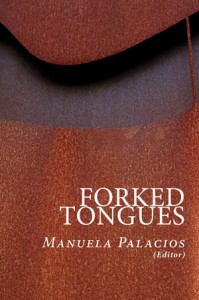 Terminamos el mes con la presentación del libro Forked Tongues, una antología editada por Manuela Palacios de poemas de poetas gallegas, vascas y gallegas traducidas al inglés por poetas irlandesas. Te esperamos hoy a las 18:00 en el Café Literario.
Terminamos el mes con la presentación del libro Forked Tongues, una antología editada por Manuela Palacios de poemas de poetas gallegas, vascas y gallegas traducidas al inglés por poetas irlandesas. Te esperamos hoy a las 18:00 en el Café Literario.
Irlanda ha sido con frecuencia fuente de inspiración para Galicia, el País Vasco y Cataluña bien sea por razones políticas, sociales o culturales. Esta antología lleva a cabo un diálogo intercultural que redefine y fortalece los lazos literarios entre estas comunidades. Poetas de Irlanda recrean en inglés los poemas de una selección de las poetas actuales más destacadas en Galicia, el País Vasco y Cataluña. Juntos enriquecen la escena literaria europea al celebrar su diversidad.
Editada por Manuela Palacios y publicada por Shearsman, la antología Forked Tongues incluye poemas de Pilar Pallarés, Chus Pato, Lupe Gómez Arto, Yolanda Castaño, María do Cebreiro (Galicia); Itxaro Borda, Miren Agur Meabe, Castillo Suárez, Leire Bilbao (País Vasco); Vinyet Panyella, Susanna Rafart, Gemma Gorga, Mireia Calafell (Cataluña).
Traducciones de Maurice Harmon, Lorna Shaughnessy, Anne Le Marquand Hartigan, Máighréad Medbh, Mary O’Donnell, Celia de Fréine, Catherine Phil MacCarthy, Susan Connolly, Paddy Bushe, Michael O’Loughlin, Paula Meehan, Keith Payne, Theo Dorgan, con el asesoramiento de Kirsty Hooper, Diana Cullell y Juan Arana-Cobos.
Se servirá vino español.
February ends with the book lauch of Forked Tongues, an anthology edited by Manuela Palacios. It consists of a selection of poems written by Galician, Basque and Catalan poets translated into English by Irish poets. We hope to see you today at 6pm at Café Literario.
Galicia, the Basque country and Catalonia have often found in Ireland an “inspiring Other” whether for political, social or cultural reasons. This anthology engages in an intercultural dialogue which redefines and strengthens the literary bonds among these communities. A selection of the most prominent Galician, Basque and Catalan contemporary women poets have their verse recreated in English by Irish writers. Together they enrich the European literary scene by celebrating its diversity.
Edited by Manuela Palacios and published by Shearsman, Forked Tongues features work by Pilar Pallarés, Chus Pato, Lupe Gómez Arto, Yolanda Castaño, María do Cebreiro (Galicia); Itxaro Borda, Miren Agur Meabe, Castillo Suárez, Leire Bilbao (Basque Country); Vinyet Panyella, Susanna Rafart, Gemma Gorga, Mireia Calafell (Catalonia).
Translations by: Maurice Harmon, Lorna Shaughnessy, Anne Le Marquand Hartigan, Máighréad Medbh, Mary O’Donnell, Celia de Fréine, Catherine Phil MacCarthy, Susan Connolly, Paddy Bushe, Michael O’Loughlin, Paula Meehan, Keith Payne, Theo Dorgan. Translation drafts by Kirsty Hooper, Diana Cullell and Juan Arana-Cobos.
Spanish wine will be served.
Cine | Film Screening: 25 kilates
Como cada miércoles te ofrecemos una muestra de buen cine. Hoy proyectamos dentro del ciclo de nuevos realizadores españoles la película 25 kilates de Patxi Amézcua. No pierdas tu cita a las 18:00 en el Café Literario.
La gran ciudad. El hábitat perfecto para buscavidas, timadores, ladrones, matones, mafiosos y policías corruptos. Abel es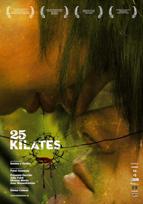 un tipo solitario que se dedica a cobrar deudas a morosos por métodos expeditivos. Kay, una jovencita que se dedica a robar coches y dar pequeños palos. Su padre, Sebas, un perista metido siempre en líos, siempre con deudas, siempre timando a unos para saldar cuentas con otros.
un tipo solitario que se dedica a cobrar deudas a morosos por métodos expeditivos. Kay, una jovencita que se dedica a robar coches y dar pequeños palos. Su padre, Sebas, un perista metido siempre en líos, siempre con deudas, siempre timando a unos para saldar cuentas con otros.
Garro, un inspector de la brigada anti-atracos de dudosa honestidad. Unos atracadores kosovares. Unos matones mexicanos. Un sicario turco… Una variopinta fauna de delincuentes en la jungla de asfalto que es la gran ciudad… Todos hartos de la vida que llevan. Todos deseando dar el último golpe, el gran golpe… Una bolsa llena de joyas puede ser la solución.
As every Wednesday we offer you a new example of good cinema. Today we screen as part of the Spanish new filmmakers series the film 25 kilates by Patxi Amézcua. Do not miss this movie today at 6pm at Café Literario.
The big city. The perfect environment for go-getters, swindlers, thieves, thugs, mafia members and corrupt policemen. Abel is a loner whose job is to collect payment from debtors using expeditious methods. Kay is a young girl who steals cars and does small-time robberies. Sebas, her father receives stolen goods and is always mixed-up in trouble, always in debt, always robbing Peter to pay Paul.
Garro, an inspector from the Crime Squad of rather dubious honesty, some Kosovar robbers, some Mexican thugs, a Turkish hired assassin. A real mixed fauna of delinquents in the asphalt.
Cine | Film screening: Vampiros en la Habana
Nos despedimos del ciclo de cine cubano con la película de animación Vampiros en la Habana. La película empieza a las 18:00 en el Café Literario. ¡Estáis todos invitados!
La divertida trama transcurre en 1933 y grupos dominantes de vampiros europeos y norteamericanos se dan cita en La Habana para hacerse con la fórmula de la mágica poción “Vampisol”, desarrollada por el científico alemán Werner Amadeus von Dracula, que permite a los vampiros exponerse al sol, sin ser afectados por los rayos ultravioleta.
La prueba viviente de la efectividad de la poción, Wolfgang Amadeus von Dracula, Pepito para sus amigos, es un divertido trompetista, que ha sido criado tan normalmente que desconoce por completo su origen vampiresco.
The last session of the Cuban film series will be today at 6pm at Cafe Literario where you can enjoy the animated film Vampiros en la Habana. All of you are invited!
The hilarious story is set in 1933. Dominant European and American vampire groups meet in Havana to get their hands on a fabulous new potion called “Vampisol”, developed by German scientist Werner Amadeus von Dracula, that lets vampires out into the sun without the harmful effects of UV rays.
Living proof of the successful potion is Wolfgang Amadeus von Dracula, Pepito to his friends, a carefree trumpet player, raised so normally that he has no idea he is a vampire.
Cine | Film screening: Viva Cuba
Si todavía no has podido disfrutar del ciclo de cine cubano, no te preocupes porque hoy tienes una nueva oportunidad.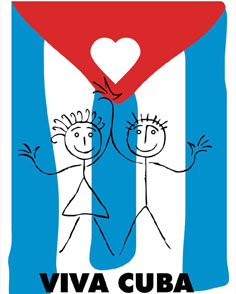 Hoy puedes asistir a la proyección de Viva Cuba a las 18:00 en el Café Literario.
Hoy puedes asistir a la proyección de Viva Cuba a las 18:00 en el Café Literario.
Malú y Jorgito son dos niños que se han prometido amistad para toda la vida, a pesar de que sus familias se detestan. Cuando la abuela de Malú se muere y su mamá decide irse a vivir fuera de Cuba, Malú y Jorgito tendrán que escaparse hasta el fin del mundo en busca de una esperanza para su amor.
Aunque es una historia de amor entre niños, la película ha sido catalogada para todas las edades.
If you still haven´t been able to enjoy the Cuban film series, don´t worry because you have a new chance today with the screening of Viva Cuba today at 6pm at Café Literario.
Malú and Jorgito are two children who have promised to be friends forever, despite their families hating each other. When Malú’s grandmother dies and her mother decides to live abroad, Malú and Jorgito will have to run to the end of the world, looking for hope for their love.
Though it is a children’s love story, the film has been tagged for all ages.
Proyección de cine | Film Screening: Los dioses rotos
No olvides tu cita con el mejor cine cubano hoy a las 18:00 horas en el Café 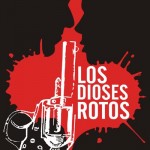 Literario. La película de hoy es Los dioses rotos.
Literario. La película de hoy es Los dioses rotos.
Laura (35 años) es una profesora universitaria que prepara su tesis de maestría sobre el famoso proxeneta cubano Alberto Yarini y Ponce de León,asesinado a balazos por sus rivales franceses que controlaban el negocio de la prostitución en La Habana de comienzos del siglo XX. Alberto y Sandra (24 años) nos hablan de una juventud signada por su entorno social. Ella, saliendo de la cárcel; él, de regreso de París en el albor de su carrera como gigoló.
Pero más allá de su anécdota, Los Dioses Rotos es una trama de valores enfrentados; una reflexión en torno a la perspectiva ética y moral de un grupo de personajes -de todos los niveles socioculturales- entre quienes los clichés de “positivos” y “negativos” no resultan sencillos de etiquetar. Drama social, suspense y melodrama comulgan en una historia interesada en resultar amena, universal y consecuente con la realidad a la que se debe.
Don´t forget your appointment with the best Cuban cinema today at 6pm at Café Literario. The movie for today is Los dioses rotos.
Laura (35 years) is a University professor preparing her master’s thesis on
the famous Cuban pimp Alberto Yarini y Ponce de León, gunned down by his French rivals, who controlled the prostitution business in Havana at the start of the 20th century. Alberto and Sandra (24 years) tell us of a youth marked by their
social environment. She, just out of jail; he, just back from Paris and starting
his career as a gigolo.
But beyond its anecdote, The Fallen Gods is a story of values confrontation; a reflexion around the ethical and moral perspective of a group of characters –from all social and cultural backgrounds- among who the “positive” and “negative” clichés are not easy to label. Social drama, suspense and melodrama together in a story aiming at being interesting, universal and consequent with its reality.
Proyección de cine | Film Screening: El Benny
Ayer inauguramos la exposición de carteles de cine cubano y esta tarde comenzamos un ciclo de cine con lo mejor del cine contemporáneo de Cuba. La proyección de hoy es El Benny. Te esperamos a las 18:00 en el Café Literario.
Recién llegado de México donde consolidó su carrera a finales de los años cuarenta, Benny Moré es el artista que a través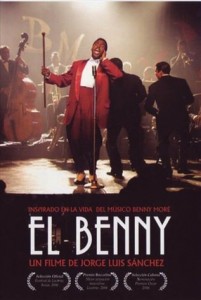 de la música y del baile hace delirar a las multitudes. El desgaste de la traición le hace fracasar en su empeño de armar la añorada banda de jazz. Frustrado y bajo los excesos de alcohol y sexo, su vida se caotiza. Con no poco esfuerzo vuelve a armar su banda y triunfa. Una venganza de viejos tiempos lo envuelve en un conflicto policial en Venezuela del que sale absuelto. Famoso y con dinero los desenfrenos de otros tiempos derivan en una severa crisis hepática que lo pone al borde de la muerte, prohibiéndole el médico definitivamente el alcohol. Contra todo pronóstico se recupera y reaparece en los principales cabarets y salones de Cuba. Una noche, en medio de un bailable, confiado por la aparente buena salud, viola la prohibición y se le acaba la vida como lo había soñado: cae sobre el escenario, delante de su público, que pasa del delirio a la consternación.
de la música y del baile hace delirar a las multitudes. El desgaste de la traición le hace fracasar en su empeño de armar la añorada banda de jazz. Frustrado y bajo los excesos de alcohol y sexo, su vida se caotiza. Con no poco esfuerzo vuelve a armar su banda y triunfa. Una venganza de viejos tiempos lo envuelve en un conflicto policial en Venezuela del que sale absuelto. Famoso y con dinero los desenfrenos de otros tiempos derivan en una severa crisis hepática que lo pone al borde de la muerte, prohibiéndole el médico definitivamente el alcohol. Contra todo pronóstico se recupera y reaparece en los principales cabarets y salones de Cuba. Una noche, en medio de un bailable, confiado por la aparente buena salud, viola la prohibición y se le acaba la vida como lo había soñado: cae sobre el escenario, delante de su público, que pasa del delirio a la consternación.
La proyección de esta película estará precedida de un cóctel inaugural cortesía de la Embajada de Cuba.
Yesterday we celebrated the opening of the Exhibition of Cuban Film Posters and this evening we start a film series with the very best of Cuban Contemporary Cinema. The screening for today is El Benny. We hope to see you today at 6pm at Café Literario.
Just back from Mexico, where he consolidated his career in the 40s, Benny Moré through music and dance turns the public delirious. Betrayed by some friends, fails to put together the jazz band of his dreams. Frustrated and under the effects of alcohol and sex, his life turns into chaos. He finally forms the band again and succeeds. Due to an old revenge he gets embroiled in a police conflict in Venezuela and is acquitted. Now famous and with money, the excesses of previous times provoked a serious hepatic crisis that nearly killed him. Doctors tell him he cannot drink alcohol ever again. Against all odds, he recovers and comes back into the main Cuban cabarets and saloons. One night, while performing, confident of his recovery, he breaks doctors’ orders against alcohol and ends his life the way had dreamed: he falls on the stage, in front of his public, which passed from delirium to consternation.
Cine | Film Screening: El abuelo
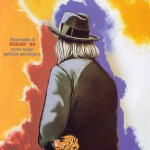 Continuamos con el ciclo de cine dedicado José Luis Garci con la proyección de una de sus peliculas más reconocidas: El abuelo. La puedes disfrutar hoy a las 18:00 horas en el Café Literario.
Continuamos con el ciclo de cine dedicado José Luis Garci con la proyección de una de sus peliculas más reconocidas: El abuelo. La puedes disfrutar hoy a las 18:00 horas en el Café Literario.
Don Rodrigo de Arista Potestad, Conde de Albrit (Fernando Fernán-Gómez), símbolo de una familia aristocrática, tras una larga estancia en América regresa a su pueblo dispuesto a desvelar un gran secreto. Pronto descubrirá el resentimiento de un pueblo desagradecido, el poder del honor de los Arista Potestad y el autentico valor de su verdadera familia.
Fernando Fernán Gómez ganador del premio Goya al “Mejor actor protagonista” en el año 1999.
Candidata a los Oscars a “Mejor película de habla no inglesa” en el año 1998.
We keep showing you the best of José Luis Garci´s cinema with the screening of one of his most remarkable films: El abuelo. You can enjoy today at 6pm at Café Literario.
Don Rodrigo de Arista-Potestad, the Heir of Albrit (Fernando Fernán-Gómez), the very symbol of an aristocratic family, returns to his town after a lengthy stay in America, ready to reveal a big secret. Soon he discovers the resentment of an ungrateful town, the power of the honour of the Arista-Potestad and the true bravery of his family.
The film was an Academy Award nominee as Best Foreign Language Film. Fernando Fernán-Gómez won Goya Award as Best Actor.
Cine | Film screening: Ninette
 Una vez más José Luis Garci entra en el escenario teatral para mirarlo a través de la cámara de cine. En esta ocasión lo hace con la visión romántica y divertida que requiere una comedia como Ninette. El Café Literario abre hoy sus puertas a las 18:00 horas para ofrecerte esta divertida y entrañable película.
Una vez más José Luis Garci entra en el escenario teatral para mirarlo a través de la cámara de cine. En esta ocasión lo hace con la visión romántica y divertida que requiere una comedia como Ninette. El Café Literario abre hoy sus puertas a las 18:00 horas para ofrecerte esta divertida y entrañable película.
Ninette es la refundición y adaptación cinematográfica de las dos obras (Ninette y un señor de Murcia y Ninette, Modas de París) que Mihura dedicó a su personaje preferido, la inteligente, sexy, graciosa y espontánea muchacha parisina que trabaja en las Galerías Lafayette y que, a partir de ahora, siempre recordaremos con la sonrisa y figura de Elsa Pataky. La película Ninette, producida por Níkel Odeon y PC29, es el homenaje que Garci ofrece en su escenario a Miguel Mihura (1905-2005), uno de los máximos humoristas y dramaturgos del siglo XX.
Ninette Sánchez (Elsa Pataky), hija de emigrantes españoles en Francia, es una inteligente, sexy, graciosa y espontánea muchacha parisina que trabaja en las Galerías Lafayette. Con su naturalidad y belleza tiene enamorado a Andrés (Carlos Hipólito), un provinciano que no puede resistirse a sus encantos…
Once again José Luis Garci enters the theatre and looks at it through the film camera. On this occasion he does this from the romantic, amusing view point which a comedy such as Ninette requires. Café Literario opens today at 6pm to show this delightful and touching movie.
Ninette is a reworking and film adaptation of two works (Ninette and the Gentleman from Murcia and Ninette, Paris Fashions) which Mihura dedicated to his favourite character, the intelligent, sexy, amusing and spontaneous Parisian girl who works in Galerias Lafayette and who, from now on, will always be remembered with the smile and figure of Elsa Pataky. The film Ninette, produced by Nikel Odeon and PC29 is Garci´s homage to Miguel Mihura (1905-2005) one of the greatest humourists and dramatists of the twentieth century.
Ninette Sánchez (Elsa Pataky), daughter of Spanish immigrants in France, is an intelligent, sexy, amusing and spontaneous Parisian girl who works at Galleries Lafayette. Her natural manner and beauty have a great impact on Andrés (Carlos Hipólito), a countryside guy who cannot resist Ninnete´s charm…
Cine | Film screening: You are the one
Te invitamos a que asistas esta tarde a la segunda sesión del ciclo de cine dedicado a José Luis Garci. Hoy a las 18:00 horas proyectamos You are the one en el Café Literario.
A finales de los años 40, Julia la hija de una acaudalada familia de Madrid, viaja hacia el pequeño pueblo asturiano de Cerralbos del Sella para recuperarse de una gran pérdida. Allí está la gran casona familiar – Llendelabarca- donde vivió los veranos más felices de su vida. Poco a poco la relación de Julia con los guardeses, con el maestro Don Orfeo e incluso con el desdichado cura del pueblo, Don Matías, hará que Julia empiece a recuperar las ganas de vivir de nuevo.
“Elegante drama rodado en blanco y negro y galardonado con 5 Premios Goya en el que Garci recupera el sabor del mejor cine sentimental americano” (Fernando Morales: Diario El País)
This evening we invite you to come to the second session of the Jose Luis Garci cinema series. You are the one will be screened today at 6m at Café Literario.
Towards the end of the 40′s, Julia, daughter of a wealthy family in Madrid, travels to the remote Asturian town of Cerralbos del Sella to get over a great loss. The family home -Llendelabarca- lies there and its where she spent the happiest summers of her life. Gradually, her relationship with the keepers, the schoolmaster Don Orfeo and also the unlucky priest of the town, Don Matías, will make Julia start to enjoy her new life to the full.
Lo fantástico: Homenaje a Bram Stoker | The Fantastic: Hommage to Bram Stoker
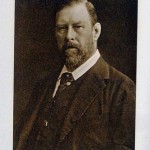 El miércoles día 28 de noviembre estarán con nosotros Luis Alberto de Cuenca y Alicia Mariño, El motivo de su visita: Bram Stoker. Porque este año se conmemora el centenario de la muerte del escritor (y matemático) dublinés. Aunque su obra fue muy prolífica, se le recuerda especiamente por la creación de una de las novelas de terror que más han influido y perdurado en la historia de la literatura: Drácula.
El miércoles día 28 de noviembre estarán con nosotros Luis Alberto de Cuenca y Alicia Mariño, El motivo de su visita: Bram Stoker. Porque este año se conmemora el centenario de la muerte del escritor (y matemático) dublinés. Aunque su obra fue muy prolífica, se le recuerda especiamente por la creación de una de las novelas de terror que más han influido y perdurado en la historia de la literatura: Drácula.
En torno a Drácula y a Bram Stoker girará la charla moderada por el Dr. Jarlath Killen, profesor de Literatura Victoriana del Trinity College Dublin. Comenzará a las 18:30 horas en nuestro Café Literario.
Luis Alberto de Cuenca (Madrid, 1950) escribe lo que él denomina poesía transculturalista en la cual lo trascendente se codea con lo cotidiano y la cultura popular se mezcla con la literaria. Fue director de la Biblioteca Nacional y Secretario de Cultura del Gobierno de España.
Alicia Mariño es licenciada en Derecho y en Filología Francesa. Ha trabajado sobre el género fantástico en distintos autores y últimamente ha orientado su labor hacia la literatura comparada, estudiando la génesis y evolución de ciertas leyendas europeas.
Instituto Cervantes Dublin is pleased to invite Luis Alberto de Cuenca and Alicia Mariño, who will payhomage to the Dubliner writer Bram Stoker. The talk will be chaired by Dr. Jarlath Killen, Lecturer in Victorian Literature at Trinity College Dublin. Do not miss this event today at 6.30pm at Café Literario.
This year we are conmmemorating the 100th anniversary of Bram Stoker´s death (1847-1912). Therefore, we would like to bring the figure of this Irish mathematician and novel and short story writer closer to you. Although his work was very prolific, he has been idolized and remembered by the creation of one of the most influential horror stories in history: Dracula.
Luis Alberto de Cuenca (Madrid, 1950), one of Spain’s most famous living poets, writes what he calls ‘transculturalist’ poetry in which the transcendental rubs shoulders with the everyday, and literary and popular cultures intermingle. He uses both free verse and traditional metres and his verse is famous for its ironic elegance and its scepticism.
Alicia Mariño has a degree in Law and in French Philology. She has worked on the fantasy genre and recently she has focused on comparative literature, studying the origin and evolution of some European legends.
Coloquio: Café-teatro científico en torno al cerebro | Discussion: Science café about the Brain
 Coincidiendo con la Semana de la Ciencia 2012, el Instituto Cervantes te trae una charla divulgativa en formato de café-teatro, que puedes disfrutar hoy a las 18:00 horas en el Café Literario. No olvides hacer tu reserva en reservas.dublin@cervantes.es
Coincidiendo con la Semana de la Ciencia 2012, el Instituto Cervantes te trae una charla divulgativa en formato de café-teatro, que puedes disfrutar hoy a las 18:00 horas en el Café Literario. No olvides hacer tu reserva en reservas.dublin@cervantes.es
¿Qué provoca las ilusiones visuales? ¿Por qué sufrimos pérdida de memoria? ¿Qué función tienen las neuronas? Si sientes un gran interés por el funcionamiento de nuestra mente y te gustaría aprender cosas en un tono desenfadado pero riguroso, no dejes pasar la oportunidad y asiste a esta charla llevada a cabo por un científico (Casto Rivadulla) y un actor (Vicente de Souza).
Disfruta de una bebida gratuita mientras asistes a la actividad.
During Science Week 2012, Instituto Cervantes brings you an informal and informative talk. You can enjoy it today at 6pm at Cafe Literario. Don´t forget make your reservation in reservas.dublin@cervantes.es
What creates visual illusions? Why do we suffer from memory loss? What is the function of neurons? If you are interested on how our mind works and you would like to learn more about it in an informal but accurate fashion, don’t miss this opportunity and come along to this talk hosted by a scientist and an actor.
Have a free drink while enjoying our science café.
Presentación de libro: “El ruido de las cosas al caer” de Juan Gabriel Vásquez | Book launch: “The sound of things falling” by Juan Gabriel Vásquez
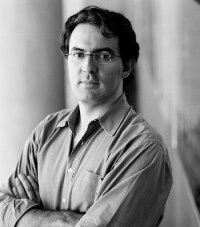 Hoy a partir de las 19:00 horas podrás disfrutar de la presentación de la traducción al inglés del último libro del autor colombiano Juan Gabriel Vásquez. El acto tendrá lugar en el Café Literario.
Hoy a partir de las 19:00 horas podrás disfrutar de la presentación de la traducción al inglés del último libro del autor colombiano Juan Gabriel Vásquez. El acto tendrá lugar en el Café Literario.
Se le considera uno de los mejores novelistas de su generación, y El ruido de las cosas al caer, que aborda el devenir de Colombia durante la época de Pablo Escobar, es hasta la fecha su mejor novela.
Tan pronto conoce a Ricardo Laverde, el joven Antonio Yammara comprende que en el pasado de su nuevo amigo hay un secreto, o quizá varios. Su atracción por la misteriosa vida de Laverde, nacida al hilo de sus encuentros en un billar, se transforma en verdadera obsesión el día en que éste es asesinado.
Convencido de que resolver el enigma de Laverde le señalará un camino en su encrucijada vital, Yammara emprende una investigación que se remonta a los primeros años setenta, cuando una generación de jóvenes idealistas fue testigo del nacimiento de un negocio que acabaría por llevar a Colombia —y al mundo— al borde del abismo.
Juan Gabriel Vásquez (Rosario, Colombia, 1973) estudió derecho en su ciudad natal y más tarde se doctoró en Literatura Latinoamericana en La Sorbona. Actualmente reside en Barcelona. Es autor de tres novelas “oficiales” —Los informantes, Historia secreta de Costaguana y El ruido de las cosas al caer—, aunque escribió otras cuando tenía 23 y 25 años de edad, que él prefiere eliminar. Sus novelas han sido traducidas en Inglaterra, Francia, Holanda, Italia y Polonia.
We are delighted to invite you to the book launch of the translation into English of the last novel written by Colombian writer Juan Gabriel Vásquez. The event will take place today at 7pm at Café Literario.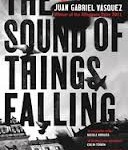
Juan Gabriel Vasquez is one of the leading novelists of his generation, and The Sound of Things Falling that tackles what became of Colombia in the time of Pablo Escobar is his best book to date.
No sooner does he get to know Ricardo Laverde than young Antonio Yammara realises that his new friend has a secret, or rather several secrets. Antonio’s fascination with the life of Laverde begins by casual acquaintance in a billiard hall and grows until the day Ricardo is murdered.
More out of love with life than ever, he starts asking questions until the questions become an obsession that leads him to Laverde’s daughter. His troubled investigation leads all the way back to the early 1960s, marijuana smuggling and a time before the cocaine trade trapped a whole generation of Colombians in a living nightmare of fear and random death.
Juan Gabriel Vásquez (Rosario, Colombia, 1973) studied law in his hometown and obtained a phd in Latin American Literature in the Sorbone University. At present he lives in Barcelona. He has published three “official” novels – The informers, The secret history of Costaguana and The Sound of Things Falling— however he wrote others at the age of 23 and 25 which he prefers to omit. His works have been translated in England, France, Netherlands, Italy and Poland.
Hoy leemos con | Today we are reading with: Ita Daly, Rafael Gumucio, Maighréad Medbh, Lorenzo Silva.
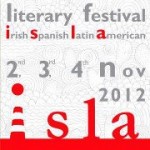 Para finalizar el Festival Literario ISLA, os ofrecemos unas lecturas en el Café Literario, el 4 de Noviembre a las 12.45.
Para finalizar el Festival Literario ISLA, os ofrecemos unas lecturas en el Café Literario, el 4 de Noviembre a las 12.45.
Última lectura del festival que clausura este festín literario con las voces de estos cuatro escritores que leerán una selección de su obra en su lengua original. Presenta: Megan Specia.
Ita Daly (Drumshanbo, Leitrim, Irlanda) ha publicado cinco novelas, una colección de cuentos y dos libros infantiles. Ha recibido el premio Hennessy Literary Award y el Irish Times Short Story Award. Su obra ha sido traducida al sueco, danés, japonés, italiano y alemán y sus relatos cortos han aparecido en revistas de Irlanda, Inglaterra y Estados Unidos. Uno de sus libros de relatos, The Lady With the Red Shoes, forma parte del plan de estudios de las escuelas de secundaria alemanas.
Rafael Gumucio (Santiago, Chile, 1970) es escritor y profesor de castellano y se licenció en Literatura por la Universidad de Chile. Ha trabajado como periodista en varios diarios. En 1995 publicó el libro de relatos Invierno en la Torre y Memorias Prematuras. Ha publicado también las novelasComedia Nupcial, Los Platos Rotos y Páginas Coloniales. Su última novela es La Deuda (2009). Actualmente es Director del Instituto de Estudios Humorísticos de la Universidad Diego Portales y co-conductor del programa Desde Zero en Radio Zero. Ha recibido el premio Anna Seghers, Alemania, 2002.
Máighréad Medbh (Condado de Limerick, Irlanda) ha publicado cinco libros de poesía y un audiolibro. Fue pionera de la performance poética en Irlanda en los años 90. Su colección más reciente es Twelve Beds for the Dreamer (2010). La obra de Máighréad ha sido publicada en una gran variedad de antologías y ha escrito versiones de poemas gallegos para dos antologías recientes editadas por Manuela Palacios (Universidad de Santiago de Compostela).
Lorenzo Silva (Madrid, España, 1966) ha escrito, entre otras, las novelas La flaqueza del bolcheviqueque ha sido llevada al cine por Manuel Martín Cuenca, y Carta blanca. Ha publicado también libros infantiles y juveniles, además de ensayos. Es especialmente conocido por la serie policíaca protagonizada por los investigadores Bevilacqua y Chamorro, iniciada conEl lejano país de los estanques (Premio Ojo Crítico 1998), y a la que siguió, entre otras, El alquimista impaciente (Premio Nadal 2000). Su último libro es Niños Feroces (2011). Su obra ha sido traducida a numerosos idiomas, como ruso, francés, alemán, italiano o griego.
To close the ISLA Literary Festival, we offer some readings at Café Literario, in November 4th at 12:45.
This literary festival will close with poetry readings by these four writers in their original language. Introduced by: Megan Specia.
(Drumshambo, Co. Leitrim) has published five novels, one collection of short stories and two books for children. She has won two Hennessy Literary Awards and an Irish Times Short Story Award. Her last novel, Unholy Ghosts (1997), was long listed for the International IMPAC Dublin Literary Award. Her work has been translated into Swedish, Danish, Japanese, Italian and German and her short stories have appeared in magazines in Ireland, England and America. Her short story collection The Lady With the Red Shoes (1980) is currently on the secondary school curriculum in Germany.
Rafael Gumucio (Santiago, Chile, 1970) has worked as a journalist for many Chilean and Spanish newspapers, as well as the New York Times. In 1995 he published the collection of short stories Invierno en la Torre and Memorias prematuras. He also published the novels Comedia Nupcial, Los Platos Rotos and Páginas Coloniales. His latest novel, La Deuda, was published in 2009. He now works as the director of the Institute for Humour Studies of the University Diego Portales and is co-conductor of Desde Zero at the radio station Zero. He received the Anna Seghers Award in Germany in 2002.
Máighréad Medbh (Co. Limerick) has five published poetry collections and an audio CD. She was a pioneer of performance poetry in Ireland in the nineteen-nineties. Her most recent collection, Twelve Beds for the Dreamer was published in 2010. Máighréad has been published in a wide range of anthologies, and has written versions of Galician poems for two recent anthologies edited by Manuela Palacios of Universidad de Santiago de Compostela.
Lorenzo Silva (Madrid, Spain, 1966) is author of novels such as La Flaqueza del Bolchevique which was adapted for cinema by Manuel Martín Cuenca, and Carta Blanca. He has also published books for children and young adults, as well as essays. He is especially known for the crime series starring detectives Bevilacqua and Chamorro, the series started with El lejano país de los estanques winner of the Ojo Crítico Award in 1998, and was followed by El Alquimista Impaciente winner of the Nadal Award in 2000, the later being adapted to cinema by Patricia Ferreira. His latest book Niños Feroces was published in 2011. His books have been translated into numerous languages such as Russian, French, German, Italian and Greek.
Mesa redonda | Round table discussion: Palabras e imágenes, cine y literatura. (Words and images, cinema and literature)
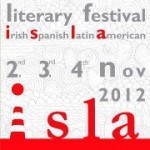 Comenzamos el último día del Festival Literario ISLA con una discusión literaria que tendrá lugar a las 11:00 en el Café Literario.
Comenzamos el último día del Festival Literario ISLA con una discusión literaria que tendrá lugar a las 11:00 en el Café Literario.
Cine y literatura, novela gráfica o cómo surgen historias narradas en imágenes y/o palabras serán algunos temas de los invitados Javier Mariscal (diseñador), Fernando Trueba (director de cine) y Mark O’Halloran (actor y guionista). Modera: Ciaran Carty.
Javier Mariscal (Valencia, 1950) es ante todo un creador de imágenes que desarrolla su trabajo en todo tipo de soportes y disciplinas. Junto con el equipo del Estudio Mariscal, que fundó en 1989, ha realizado numerosos proyectos internacionales (H&M, America’s Cup, Camper, etc.), además de la exposición sobre su trabajo Mariscal Drawing Life en el Design Museum de Londres y dos publicaciones monográficas: Mariscal Drawing Life y Sketches. En 2010, ha dirigido junto a Fernando Trueba, Chico y Rita y se ha publicado el cómic Chico & Rita. En 2011 ha publicado también el libro ilustrado Los Garriris.Chico & Rita se ha traducido al inglés en 2011, publicándose también en Francia y Países Bajos.
Mark O’Halloran (Ennis, Condado de Clare) es un dramaturgo, actor y guionista irlandés. Escribió el guión de dos películas muy aplaudidas en la escena cinematográfica: En la primera, Adam and Paul(2004) también asumió unos de los papeles principales, ganando con su trabajo el premio del Festival Internacional de Cine de Gijón al mejor actor (2005) y el Evening Standard British Film Award al mejor guión (2006). Su segunda película, Garage, se estrenó en el Festival de Cine de Cannes en el 2007 y ganó el premio CICAE a la mejor película, así como el Irish Film and Television Award al mejor guión de película (2008), entre muchos otros. También escribió el guión para la serie Prosperity, del canal RTE en 2007, por el cual ganó el Irish Film and Television Award al mejor guión de televisión (2008). Su última obra de teatro Trade se estrenó en el Festival de Teatro del Ulster Bank Dublin en septiembre de 2011.
Fernando Trueba (Madrid, España, 1955) es guionista, editor y director de cine. Entre 1974 y 1979 trabajó como crítico de cine para El País y en 1980 fundó la revista mensual de cine Casablanca, la cual dirigió y editó durante los primeros dos años. En 1992, su película Belle Époque, obtuvo 9 premios Goya y, en 1993, obtiene el Oscar a la mejor película de habla no inglesa. En 1997 publica su libroDiccionario del cine y es editor del Diccionario del Jazz Latino (1998). Recientemente ha llevado al cine, junto al diseñador Javier Mariscal, la película de animación Chico y Rita, que ha recibido el Goya a la mejor película de animación y que ha sido nominada al Óscar como Mejor Película de animación.
To begin the last day of ISLA Literary Festival, we start with a literary discussion that will take place at 11:00 in Café Literario.
Cinema and literature, graphic novel or how stories told in images or words come to life will be some of the topics dealt with by guests Javier Mariscal (designer), Fernando Trueba (cinema director) and Mark O’Halloran (actor, script writer). Chaired by Ciaran Carty.
Javier Mariscal (Valencia, 1950) is, first and foremost, an image creator who develops his work using all kinds of supports and disciplines. Together with the team of Estudio Mariscal, which he founded in 1989, in recent years, and among many other things, he has done several interior design and graphics (H&M, America’s Cup, Camper, etc), the exhibition of his work Mariscal Drawing Life in the Design Museum of London and two monographic publications: Mariscal Drawing Life and Sketches. In 2010, he premiered the full-length cartoon film Chico & Rita which he jointly directed with Fernando Trueba and produced the comic Chico & Rita. In 2011 he published the illustrated book Los Garriris. Chico & Rita has been translated into English in 2011 and has also been published in France and The Netherlands.
Mark O’Halloran (Ennis, Co. Clare) is an Irish playwright, actor and screen writer. He wrote the script for two critically lauded Irish films: On the first one, Adam and Paul (2004), he also took one of the leading roles, winning the Gijón International Film Festival Award for Best Actor (2005) and the Evening Standard British Film Award for Best Screenplay (2006). His second film, Garage, premièred at the Cannes Film Festival in 2007 and won the CICAE award for Best Film and the Irish Film and Television Award for Best Script for Film (2008), among many others. He also wrote the script for the four-part television series Prosperity on RTE in 2007, for which he won the Irish Film and Television Award for Best Script for Television (2008). His latest play Tradepremièred at the Ulster Bank Dublin Theatre Festival in September 2011.
Fernando Trueba (Madrid, Spain, 1955) is a scriptwriter, editor and film director. Between 1974 and 1979 he worked as a film critic for Spain’s national daily newspaper El Pais and in 1980 he founded the monthly film magazine Casablanca, which he directed and edited during its first two years. In 1992, his film Belle Époque received 9 Goya Awards and, in 1993, it was awarded the Oscar for Best Foreign Language film. In 1997 he published the book Diccionario del cine and is the editor of theDiccionario Del Jazz Latino. He has recently broughtChico & Rita to the big screen working with designer Javier Mariscal. This film was awarded the Goya for Best Animated Film, as well as an Academy Award nomination for Best Animated Film.
Proyección | Film Screening: Neruda, el Hombre y su Obra
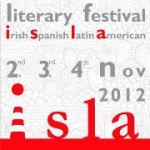 Para terminar el segundo día del Festival de Literatura ISLA os ofrecemos un interesante cortometraje de Neruda. Te esperamos el próximo día 3 de Noviembre a las 18:00 en el Café Literario.
Para terminar el segundo día del Festival de Literatura ISLA os ofrecemos un interesante cortometraje de Neruda. Te esperamos el próximo día 3 de Noviembre a las 18:00 en el Café Literario.
Este documental rescata la memoria, pero también la vigencia de obra y pensamiento de Pablo Neruda, uno de los personajes mas universales de la cultura chilena, y es la primera y única hasta ahora que abarca completamente la vida y obra de este fundamento de la identidad chilena. La cámara recorre Chile y los diversos países del mundo donde Neruda llevó su arte y, con ello la voz de Chile y de lo más genuino de su gente. Además de profundizar en los valores artísticos, el documental aborda aspectos inéditos de Neruda como creador, pensador, amante, luchador social y embajador cultural, lo que convierte este audiovisual en un valioso documento contemporáneo no solo para los chilenos, sino también como un importante patrimonio en el archivo que la cultura mundial debe tener sobre Chile.
To finish the second day of ISLA Literary Festival we offer an interesting short of Neruda. We hope to see you the next November 3rd at 18:00 hrs in Café Literario.
This documentay recovers the memory, but also the validity of Pablo Neruda’s work and thought, one of the most universal characters of Chilean culture, and it is the first and so far only one to include completely the life and work of this foundation of Chilean identity. The camera travels around Chile and the various countries of the world where Neruda took his art, and with it the voice of Chile and of the most genuine of its people. In addition to studying in depth the artistic values, the documentary approaches some of Neruda’s unknown apects as a creator, thinker, lover, social fighter and cultural ambassador, which makes this film a valuable contemporary document not only for the Chilean, but also as an important heritage to the archive that world culture must have about Chile.
